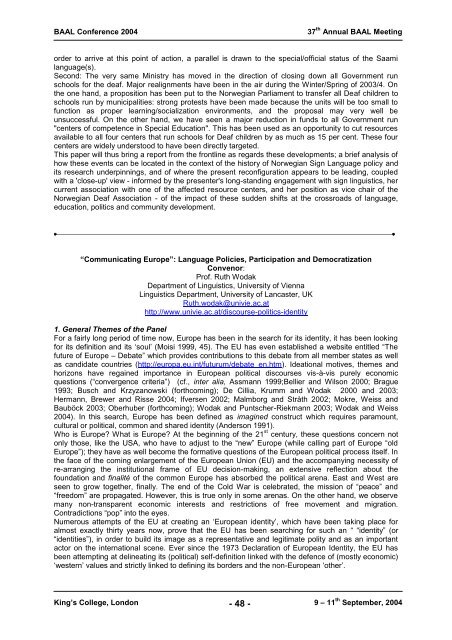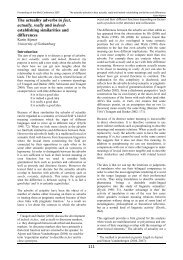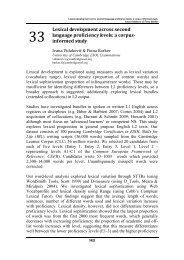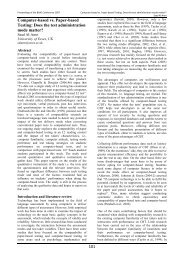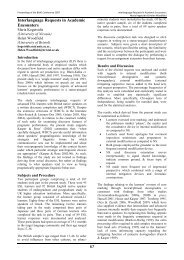Colloquia - British Association for Applied Linguistics
Colloquia - British Association for Applied Linguistics
Colloquia - British Association for Applied Linguistics
You also want an ePaper? Increase the reach of your titles
YUMPU automatically turns print PDFs into web optimized ePapers that Google loves.
BAAL Conference 2004 37 th Annual BAAL Meeting<br />
order to arrive at this point of action, a parallel is drawn to the special/official status of the Saami<br />
language(s).<br />
Second: The very same Ministry has moved in the direction of closing down all Government run<br />
schools <strong>for</strong> the deaf. Major realignments have been in the air during the Winter/Spring of 2003/4. On<br />
the one hand, a proposition has been put to the Norwegian Parliament to transfer all Deaf children to<br />
schools run by municipalities: strong protests have been made because the units will be too small to<br />
function as proper learning/socialization environments, and the proposal may very well be<br />
unsuccessful. On the other hand, we have seen a major reduction in funds to all Government run<br />
"centers of competence in Special Education". This has been used as an opportunity to cut resources<br />
available to all four centers that run schools <strong>for</strong> Deaf children by as much as 15 per cent. These four<br />
centers are widely understood to have been directly targeted.<br />
This paper will thus bring a report from the frontline as regards these developments; a brief analysis of<br />
how these events can be located in the context of the history of Norwegian Sign Language policy and<br />
its research underpinnings, and of where the present reconfiguration appears to be leading, coupled<br />
with a 'close-up' view - in<strong>for</strong>med by the presenter's long-standing engagement with sign linguistics, her<br />
current association with one of the affected resource centers, and her position as vice chair of the<br />
Norwegian Deaf <strong>Association</strong> - of the impact of these sudden shifts at the crossroads of language,<br />
education, politics and community development.<br />
“Communicating Europe”: Language Policies, Participation and Democratization<br />
Convenor:<br />
Prof. Ruth Wodak<br />
Department of <strong>Linguistics</strong>, University of Vienna<br />
<strong>Linguistics</strong> Department, University of Lancaster, UK<br />
Ruth.wodak@univie.ac.at<br />
http://www.univie.ac.at/discourse-politics-identity<br />
1. General Themes of the Panel<br />
For a fairly long period of time now, Europe has been in the search <strong>for</strong> its identity, it has been looking<br />
<strong>for</strong> its definition and its „soul‟ (Moisi 1999, 45). The EU has even established a website entitled “The<br />
future of Europe – Debate” which provides contributions to this debate from all member states as well<br />
as candidate countries (http://europa.eu.int/futurum/debate_en.htm). Ideational motives, themes and<br />
horizons have regained importance in European political discourses vis-à-vis purely economic<br />
questions (“convergence criteria”) (cf., inter alia, Assmann 1999;Bellier and Wilson 2000; Brague<br />
1993; Busch and Krzyzanowski (<strong>for</strong>thcoming); De Cillia, Krumm and Wodak 2000 and 2003;<br />
Hermann, Brewer and Risse 2004; Ifversen 2002; Malmborg and Stråth 2002; Mokre, Weiss and<br />
Bauböck 2003; Oberhuber (<strong>for</strong>thcoming); Wodak and Puntscher-Riekmann 2003; Wodak and Weiss<br />
2004). In this search, Europe has been defined as imagined construct which requires paramount,<br />
cultural or political, common and shared identity (Anderson 1991).<br />
Who is Europe? What is Europe? At the beginning of the 21 st century, these questions concern not<br />
only those, like the USA, who have to adjust to the “new” Europe (while calling part of Europe “old<br />
Europe”); they have as well become the <strong>for</strong>mative questions of the European political process itself. In<br />
the face of the coming enlargement of the European Union (EU) and the accompanying necessity of<br />
re-arranging the institutional frame of EU decision-making, an extensive reflection about the<br />
foundation and finalité of the common Europe has absorbed the political arena. East and West are<br />
seen to grow together, finally. The end of the Cold War is celebrated, the mission of “peace” and<br />
“freedom” are propagated. However, this is true only in some arenas. On the other hand, we observe<br />
many non-transparent economic interests and restrictions of free movement and migration.<br />
Contradictions “pop” into the eyes.<br />
Numerous attempts of the EU at creating an „European identity‟, which have been taking place <strong>for</strong><br />
almost exactly thirty years now, prove that the EU has been searching <strong>for</strong> such an “ “identity” (or<br />
“identities”), in order to build its image as a representative and legitimate polity and as an important<br />
actor on the international scene. Ever since the 1973 Declaration of European Identity, the EU has<br />
been attempting at delineating its (political) self-definition linked with the defence of (mostly economic)<br />
„western‟ values and strictly linked to defining its borders and the non-European „other‟.<br />
King‟s College, London 9 – 11 th - 48 -<br />
September, 2004


